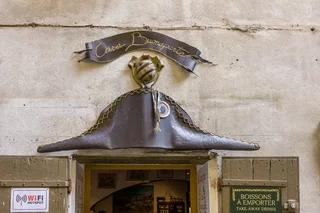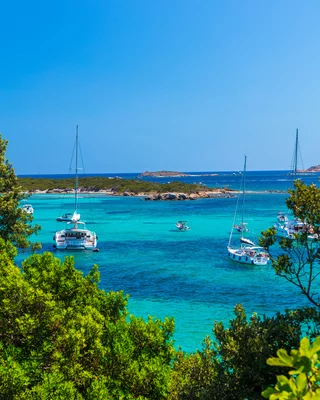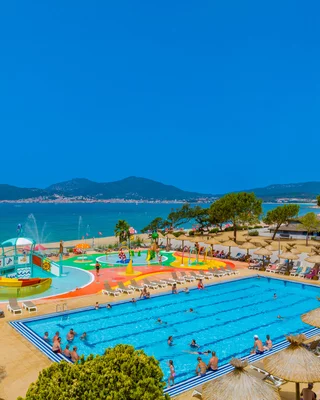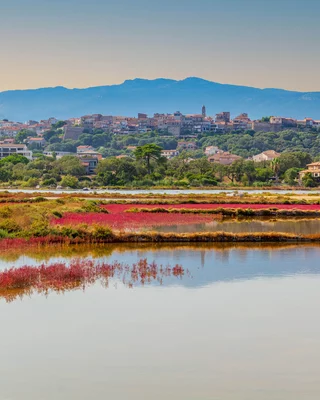Napoleon Bonaparte: the origins of the legend

The story of the first French Emperor
What were Napoleon's origins?
In 1769, after centuries of Genoese domination, the French liberated Corsica from a disputed yoke by crushing the troops of Corsican leader Pascal Paoli at Ponte-Novu, where he fled to Great Britain. Charles-Marie Bonaparte (Italian: Carlo-Maria de Buonaparte), of Genoese origin and a close associate of Paoli, fled the scene of the conflict with his pregnant wife to escape the victorious French army. Charles and Letizia Ramolino's escape through the maquis led - against all odds - to an agreement with the French. The family settled in Ajaccio, where Napoleon Bonaparte was born in August!
Through a close friendship with the new governor of Corsica instituted by the Gauls - Count de Marboeuf, the Bonaparte family quickly represented the newly-appointed Corsican nobility at the Assemblée Nationale. This role enabled them to intercede with the authorities on behalf of the island people, as much as their contacts provided the siblings with an education in the prestigious schools of the French nobility.
Did you know?
According to some sources, the relationship between Napoleon's father and mother and Marboeuf was due to the Breton Count's attraction to the sublime Letizia Bonaparte, née Ramolino! Although certain legends attributed Napoleon's birth to an adulterous affair between Marboeuf and his mother, they were refuted by several contemporary figures. DNA research also proved that the blood of Louis (10th of 14 Bonaparte siblings) was not the same as that of his alleged brother, the Emperor... In any case, whatever the motives behind the island's governor's decision to get closer to Charles and Letizia, their proximity undoubtedly played a major role in Napoleonic history.
It was at the age of 9 that Napoleon was sent to the Brienne military academy, an institution specially created to teach the sons of the aristocracy the responsibilities of their status. Little integrated, he devoted himself to reading, writing and gardening. But his military career wasn't over yet!
From young soldier to popular consul
After 5 years spent learning the rudiments of the army, Napoleon joined the exclusive École Militaire in Paris in 1784 to study artillery. Then, at the age of 20, the Revolution broke out in Paris, in which he was involved. Napoleon's rise was then in its infancy: appointed Brigadier General, ever the opportunist and ambitious, he obtained the authorization of his regiment, returned to Ajaccio, joined the local Jacobin movement and - looking for a colonel in the Corsican militia - enthusiastically defended the interests of the Revolution. After an unsuccessful attempt to wrest control of the Citadelle from royalist sympathizers, for which he was reprimanded in June 1793, Napoleon and his family were sent back to the mainland by the paolists. From then on, he decided to abandon his special allegiance to Corsica and to Frenchify the spelling of his name, preferring Napoleon to his baptismal name Napoleone Buonaparte. And, although he would later wax nostalgic about the smells of the Corsican countryside, he put his hometown fourth on the list of places he wished to be buried.
Apart from this episode, during which the valiant Genoese lost popularity, one event restored his reputation. The parliamentary coup d'état of 18 Brumaire (November 9-10 1799) made him consul for life. The young man's popularity was unquestionable, as he was elected by 3,500,000 votes to 8,400. But his greed for glory and power didn't stop there.
In 1804, from myth to reality, the date of the Empire
On May 18, 1804, a name was finally put to Napoleon's achievements: the Empire was finally proclaimed. 7 months later, the young Genoese, who had never let anything stop him, was crowned by Pope Pius VII at Notre-Dame-de-Paris cathedral. Numerous battles followed (of which the Battle of Austerlitz is the most famous), during which the first French emperor demonstrated his tenacity and determination to defend the freedom of all peoples.
In France, what did his empire create?
Loved for his courage or loathed for his despotism, Napoleon was the initiator of institutions, feats and reforms that benefit France (and even Europe!) to this day. His achievements include the creation of the Banque de France, the Legion of Honor and the Imperial University, the introduction of the baccalauréat and the drafting of the Civil Code, harmonizing the application of laws throughout France.
European hegemony
While Napoleon achieved victory after victory on behalf of France, his influence did not stop at the frontiers of Gaul...
130 was the number of départements ruled by the Empire built by the Bonaparte family at the beginning of the 19th century, stretching across the whole of Europe. While Napoleon ruled France, he also invested his brothers at the head of several kingdoms. Among others, Joseph was King of Naples and Spain, Pauline became Princess of Italy, Louis ruled the Kingdom of Holland... Napoleon's true hegemony was growing, driven by a nepotism that earned the Emperor much criticism throughout history.
The end of Napoleon's reign and his death: 1821
Napoleon's deep-seated dislike of England led him, in 1810of Tsar Alexander I's business practices, which he considered favorable to this sworn enemy across the Channel. This disagreement prompted him to wage a campaign in Russiaduring which his coalition of over 600,000 men from 20 nations was trapped by the military tactics of a smaller Russian army. Frozen steppes, disease and fire - on the banks of the Berezina and in Moscow in particular, ravaged Bonaparte's meninflicting a crushing defeat. The Empire fell...
In 1815, France, weakened and ruined by its failure at Leipzig, suffered occupation and loss of territory. While Napoleon had so far won the hearts of men and women eager to anchor the Empire's power on an international scale, many were disappointed by these violent Eastern defeats. After an enforced exile on Elba, the Emperor surrendered to England, who exiled him to Longwood (St. Helena)under the guard of 2,000 soldiers. In extreme solitude, although surrounded by 4 faithful friends, including the writer Las Cases, it was at the age of 51, on May 5, 1821, that Napoleon Bonaparte died.. He has since been laid to rest in the tomb at Les Invalides.
The Emperor's life was a hectic one, during which he left his mark on history, a life of victories and defeats, whether military or sentimental. For example, before leaving for the Italian campaign in 1796, he married Joséphine de Beauharnais, who seemed insensitive to his love. Witness his return to her:"You yourself? Ah, how could you write that letter! How cold it is! In 1809, Napoleon wanted to start a family while his wife was sterile, and the two lovers divorced. Napoleon's many writings, including his epistolary exchanges with his first wife (and with the family of his second wife, Marie-Louise of Austria), show that the warrior was above all a man who could also feel.
An imperial tour of Ajaccio
During your stay in Ajaccioin Corse-du-Sud, don't hesitate to take the the imperial tour retracing the life of Napoleon Bonaparte as a child. A historical walk beginning at the the watchtower of the Citadelle. Although the Citadelle is not accessible today, as it is occupied by the army, you can still take a stroll along boulevard Danielle Casanova and quai Napoléon.
A little detour not to be missed, the small private Capitellu museumhoused in a building dating from the Genoese era. And don't forget the A Bandera museum. The great historical figures of Corsica - Sampiero Corso, Pascal Paoli and Napoleon Bonaparte - are all represented here.
A tour that continues rue Saint-Charles in front of the Emperor's family home which became a national museum in 1967. Further on, Ajaccio Cathedralplace of worship of the Bonaparte family and where the young Napoleon was baptized.. Continue on to rue Bonaparte, " la Carrughiu drittu ". This leads to the Place du Maréchal Foch, home to the famous statue of Bonaparte aux Lions, and on to the Palais Fesch, overlooking the harbour and the city.
If you visit Ajaccio in Augustdon't miss the parade and Napoleonic Days which liven up the streets of Ajaccio!
Our local advisors are on hand to help you put together a personalized tour to suit your tastes and desires, on the roads of history!
Our local experts tell you all about our trips to Corsica!
What is the myth of Napoleon?
The myth of Napoleon, nurtured by figures such as General Bonaparte and his meteoric rise, is an idealized representation of his life and work. He is portrayed as a brilliant military strategist, a political visionary and a charismatic conqueror. This romantic tale, celebrated by Jacques-Louis David, blends military glory, political reform and personal tragedy, making Napoleon one of history's most fascinating figures. Victor Hugo, meanwhile, helped to challenge this narrative by offering a critical perspective on his reign.
Who inspired Napoleon?
Napoleon Bonaparte, an emblematic figure in French history, was inspired by many historical, philosophical and political figures of his time. Among the personalities who influenced his ideas and actions were Julius Caesar, for his military and political leadership, and Charlemagne, for his ambition to reunite Europe. Napoleon was also influenced by the ideals of the Enlightenment and the principles of the French Revolution, such as the equality of citizens before the law and the promotion of merit. In addition, his own experiences on the battlefield and in the spheres of power helped shape his worldview and political ambitions.



